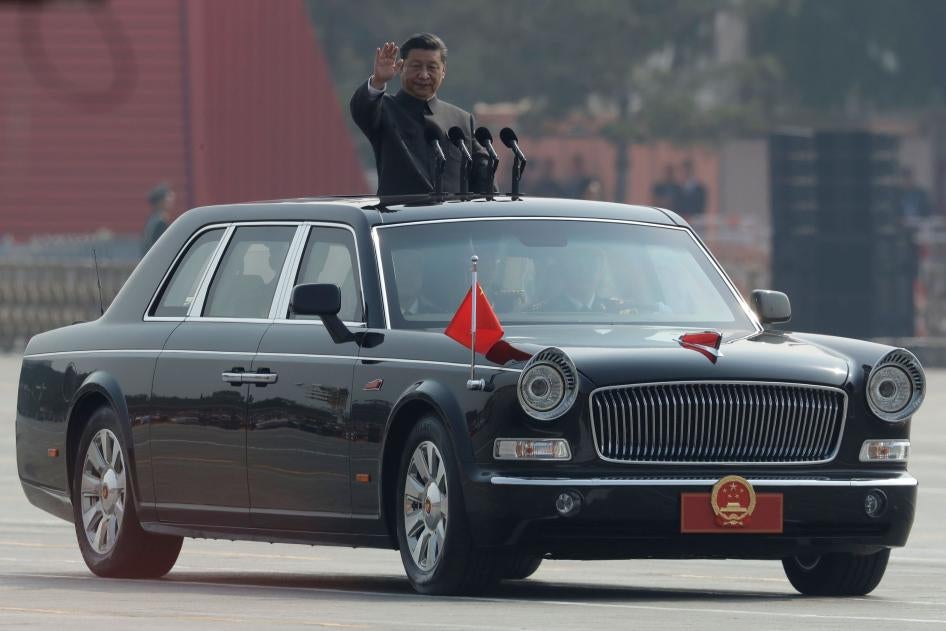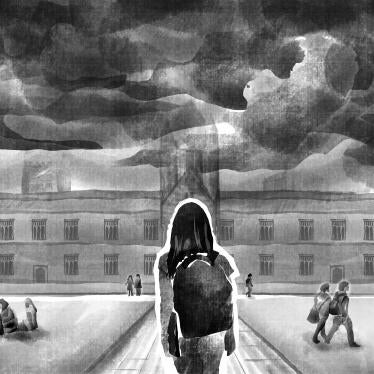The Chinese Communist Party is set to open its 20th National Congress on Oct. 16. Xi Jinping will almost certainly secure a third term as party general secretary — and therefore continue his profound assault on human rights across the country and around the globe. Are the world’s democracies up to the task?
Over the past decade, Xi’s regime has conducted brutal assimilationist campaigns with especially grim consequences for Tibetans, Uyghurs, people in Hong Kong, and others. He has reengineered the party state, reversing previous decades of slow progress toward legal reform. From the 2016 counterterrorism law to the 2017 Foreign Nongovernmental Organization Activities in China law to the Orwellian 2020 “national security” law imposed on Hong Kong, Xi’s entourage has used the law to entrench party power.
Xi’s repression has not stopped at China’s borders. In relentless pursuit of global power, Chinese authorities have dramatically expanded their capacity to commit human rights violations around the world. State-owned enterprises and Belt and Road Initiative projects often violate labor, land and Indigenous people’s rights and harm the environment in other countries. Other governments are pressured to forcibly return refugees and asylum seekers.
Some members of diaspora communities — even those who have obtained citizenship in democracies — are under such close scrutiny or harassment that they don’t feel secure exercising their rights. Chinese authorities now seek to influence public education in democracies, neutralize key international human rights institutions and shape global technical standards to expand their vision of technology as an instrument of control and coercion.
Where are the democracies?
Few governments were until recently willing to impose any meaningful consequences in response to serious human rights violations, and fewer still to consider dialing back the economic relationships that have given Beijing such leverage. Most have been painfully slow to recognize that Beijing poses threats to human rights inside their own countries. For democracies, defending international human rights institutions and norms has been a relatively low priority.
This must change.
To challenge Xi and his allies’ sense of impunity, democracies should use all available domestic and international means to investigate and appropriately prosecute those responsible for crimes against humanity. Acting through United Nations mechanisms, particularly the Human Rights Council, requires coordination and commitment, but it has the additional advantage of building that whole system’s resilience to insulate it from Beijing’s pressure — and last week’s close vote on a debate about Uyghurs shows how critical that goal is. There are also avenues to justice available in democracies, particularly by way of opening national investigations.
Democracies can no longer ignore the reality that their economic interdependence with Xi’s government has helped sustain human rights abuses. Canada, the European Union, Britain and the United States have begun imposing some sanctions in response to Chinese government human rights violations. The U.S. Uyghur Forced Labor Prevention Act has made it harder for goods produced in China with forced labor to enter the United States, and has helped gain recognition for the idea that companies and consumers should not want to profit from repression.
But large swaths of economic activity — from finance to manufacturing — remain largely unexamined. Business ties to the Chinese companies and institutions that provide surveillance equipment and services, as well as to the Chinese military-industrial complex, deserve particular scrutiny. Some democracies already have tools to limit trade as a means of pressuring Beijing to improve its human rights record. But they should also urgently adopt laws requiring companies to conduct human rights due diligence to identify and address risks of complicity in China and elsewhere.
Democracies can also do a better job of trying to protect and preserve the distinct identities Beijing seeks to obliterate. This could take several forms, from expediting asylum claims for those Beijing has driven out, and ensuring that they can live with full protection of their rights in democracies, all the way through to underwriting curriculums in languages such as Cantonese, Mongolian, Tibetan and Uyghur.
Governments should also make clear they are firmly opposed both to Chinese government repression and to anti-Chinese racism, a horrific phenomenon amplified during the pandemic. Some have been hesitant to do the former, fearing it exacerbates the latter. The Chinese government decries anti-Chinese sentiment in democracies for self-serving purposes; democracies need to take strong steps to tackle both problems.
They should support Chinese-language media platforms not subject to Beijing’s censorship. Encouraging — and investing in — innovations that give people easy access to uncensored news and other information will most likely pay dividends. Governments should require Chinese social media companies to publicly disclose what content they have censored or suppressed at the behest of the Chinese government as well as the legal basis for doing so.
Last but far from least: No democratic government should ever forget that people across China — regardless of what self-interested authoritarians in Beijing claim — are entitled to human rights. Giving independent activists from China now living in democracies a visible seat at policy tables reflects real — not just rhetorical — support for their ideas and work. It will also help to generate new policy ideas and to challenge Xi’s claim that he and “China” are one and the same.
Xi has had a decade to show his true human rights colors. From crimes against humanity to the abusive “zero-covid” policies to an unwillingness to condemn Russia for war crimes in Ukraine, the outcome is far bleaker than most predicted. The costs of allowing these trends to go unchecked into the future should motivate action now. Democracies should move swiftly to defend human rights inside and outside China.









